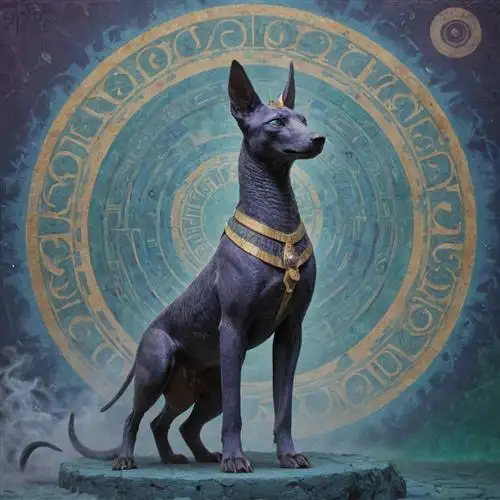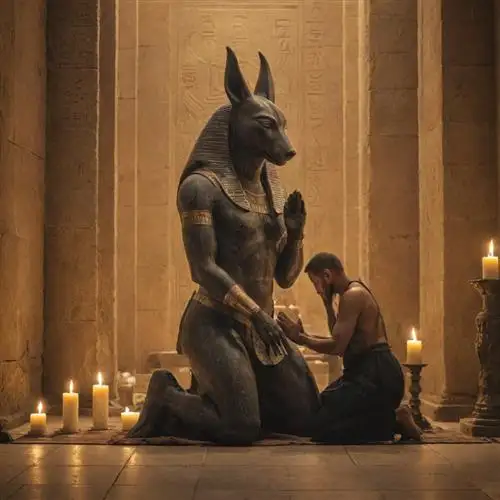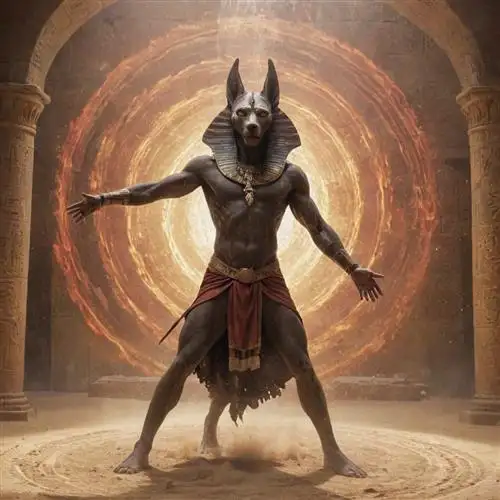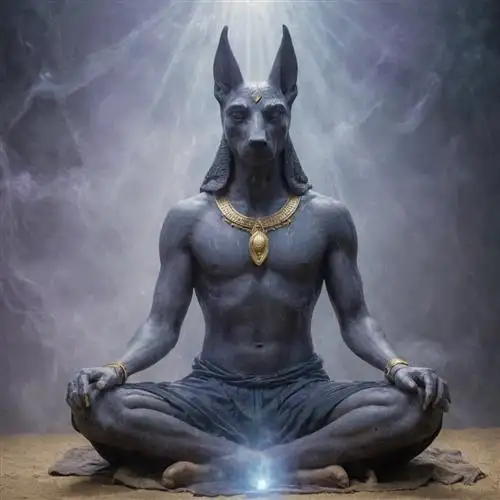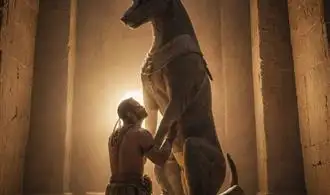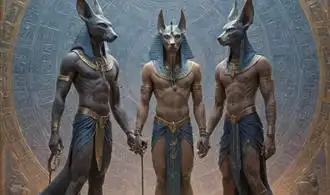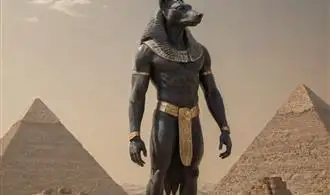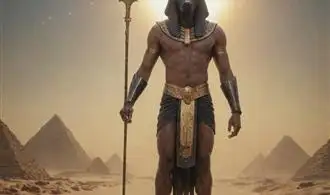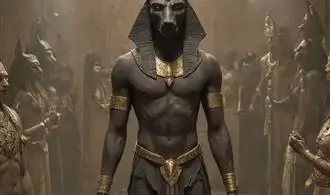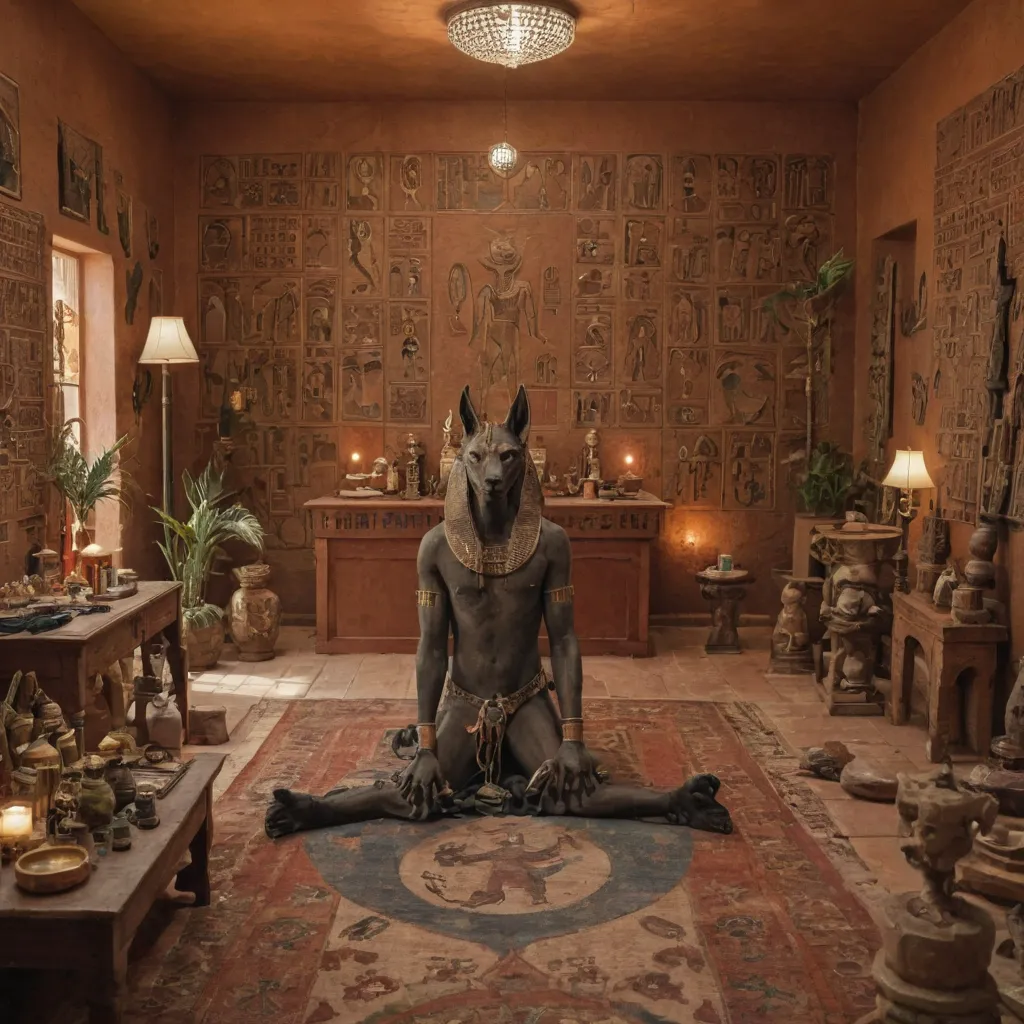
Understand the Essence of Anubis
Anubis, the ancient Egyptian deity associated with the afterlife, is a complex and multifaceted figure. To truly connect with Anubis, it's crucial to understand the essence of this enigmatic god. Anubis is the jackal-headed deity who presided over the process of mummification and the protection of the dead. He was responsible for guiding the souls of the deceased through the perilous journey of the afterlife, ensuring their safe passage to the realm of the dead.
The significance of Anubis extends far beyond his role as a funerary deity. He was also associated with healing, transformation, and the preservation of the dead. Anubis was believed to have the power to heal the sick and wounded, and his presence was often invoked in rituals and ceremonies aimed at promoting physical and spiritual well-being.
At the core of Anubis' essence is his deep connection to the cycle of life and death. As the guardian of the necropolis and the protector of the dead, Anubis embodied the pivotal transition between the physical and the spiritual realms. His role in the mummification process, which was believed to preserve the soul and physical form of the deceased, underscores his importance in the ancient Egyptian conception of the afterlife.
To connect with Anubis without engaging in ritual practices, it's essential to cultivate a deep understanding and appreciation for the deity's multifaceted nature. This can be achieved through study, contemplation, and a willingness to explore the deeper symbolic and archetypal meanings associated with Anubis.
Some key aspects of Anubis that can facilitate a deeper connection include:
- His role as a psychopomp, guiding the souls of the dead through the afterlife
- His association with the process of transformation and rebirth
- His connection to the liminal spaces between the physical and spiritual realms
- His symbolic representation of the balance between life and death, light and dark
- His role as a protector of the dead and a healer of the living
Cultivate Reverence for Anubis
Cultivating reverence for Anubis, the ancient Egyptian god of the dead, is a profound and deeply rewarding journey. Anubis is a complex and multifaceted deity, often depicted with the head of a jackal, who played a crucial role in the Egyptian afterlife. To connect with this powerful figure, it is essential to understand his significance and the ways in which we can honor his presence in our lives.
At the heart of Anubis' role is his function as the guardian of the dead, responsible for the embalming process and the weighing of the soul against the feather of truth. This sacred duty imbues Anubis with a profound sense of authority and respect, as he serves as the gatekeeper to the afterlife. By recognizing and embracing Anubis' role in this liminal space, we can cultivate a deep reverence for his guidance and protection.
One powerful way to connect with Anubis is through contemplation and meditation. By quieting the mind and focusing on the jackal-headed deity, we can open ourselves to his presence and seek his wisdom. Visualizing Anubis, his piercing gaze, and his unwavering commitment to justice and truth can help us align our own values and deepen our understanding of the mysteries of death and the afterlife. Anubis Predicts the Future of the Afterlife explores the deity's prophetic role in shaping our understanding of the hereafter.
Additionally, honoring Anubis through offerings and symbolic gestures can foster a meaningful connection. Leaving gifts of black or dark-colored items, such as candles, incense, or flowers, can be a way to show reverence and respect. Incorporating the jackal image into personal altars or shrines can also serve as a visual reminder of Anubis' presence and the importance of honoring the cycle of life and death.
Embody the Attributes of Anubis
Connecting with the deity Anubis transcends the need for complex rituals. By embodying the core attributes associated with this revered figure, individuals can forge a profound and transformative relationship. Anubis, the jackal-headed god of the ancient Egyptian pantheon, is often depicted as the guardian of the underworld, the embalmer of the dead, and the protector of the deceased.
To connect with Anubis on a deeper level, it is essential to cultivate and reflect upon the following attributes:
- Discernment and Clarity: Anubis is known for his keen discernment, the ability to see beyond the veil of illusion and perceive the truth. By honing your own powers of observation and critical thinking, you can develop a sharper awareness of the world around you and the complexities of the human experience.
- Compassion and Empathy: As the guide and protector of the dead, Anubis embodies a profound sense of compassion. By cultivating empathy and understanding towards all beings, you can mirror this aspect of the deity and foster a deeper connection with the cycle of life and death.
- Transformation and Rebirth: Anubis is associated with the process of mummification, symbolizing the journey of transformation and rebirth. By embracing the cycles of change and growth within your own life, you can align yourself with Anubis's role as a facilitator of personal and spiritual evolution.
- Ritual and Ceremony: While not requiring elaborate rituals, connecting with Anubis can be enhanced through the intentional creation of sacred spaces and the incorporation of symbolic elements. This might include the use of candles, incense, or other physical representations that resonate with the deity's essence.
- Meditation and Contemplation: Engaging in mindful practices such as meditation and contemplation can deepen your understanding of Anubis and foster a more intimate connection. By quieting the mind and tuning into the subtle energies of the deity, you can open yourself to profound insights and a heightened sense of awareness.
Develop Intuitive Connections with Anubis
Establishing an intuitive connection with Anubis, the Egyptian god of the dead, can be a transformative experience for those seeking deeper spiritual and metaphysical understanding. Rather than relying solely on formal rituals, there are several ways to cultivate a more personal and intuitive rapport with this powerful deity.
Meditation and Visualization: One of the most effective ways to connect with Anubis is through regular meditation and visualization practices. Spend time envisioning Anubis as a guiding presence, perhaps as a jackal-headed figure or a more abstract energy. Visualize him accompanying you on your spiritual journey, offering wisdom and protection. Pay attention to any intuitive insights or messages that arise during these meditative sessions.
Dream Work: Anubis is deeply connected to the realm of dreams and the subconscious. Keep a dream journal and be attentive to any dreams or visions involving Anubis. The symbols, archetypes, and messages that emerge in these dreams can provide valuable insight into your personal relationship with the deity. Consider performing a ritual or meditation before sleep to invite Anubis into your dreamscape.
Symbolic Representation: Surround yourself with images, statues, or other representations of Anubis that resonate with you. The physical presence of these symbols can serve as a focal point for meditation and communion with the deity. Additionally, you may consider wearing jewelry or accessories that feature the jackal-headed figure or the ankh, a symbol closely associated with Anubis.
Contemplation and Reflection: Spend time contemplating the attributes and roles of Anubis, such as his association with the afterlife, embalming, and the weighing of the heart. Reflect on how these aspects of the deity's nature may resonate with your own spiritual and personal growth. Consider how Anubis can guide you through transitions, transformations, and the exploration of the subconscious.
Intuitive Divination: Develop your intuitive abilities by incorporating divination practices, such as tarot, oracle cards, or pendulum work, into your connection with Anubis. Invite the deity to guide and inform your readings, paying close attention to any messages or insights that arise. Over time, you may find that your intuitive connection with Anubis deepens, allowing for more nuanced and accurate divination.
Rituals and Offerings: While formal rituals are not necessary for developing an intuitive connection with Anubis, you may choose to incorporate simple offerings or small rituals into your practice. This could include leaving small gifts, such as incense, flowers, or symbolic objects, in a dedicated space or altar. The act of making an offering can deepen your engagement with the deity and strengthen the bond between you.
Integrate Anubis Symbolism into Daily Life
Connecting with the Anubis deity doesn't always require complex rituals or elaborate ceremonies. Instead, you can incorporate Anubis' symbolism and energy into your daily life in simple, meaningful ways. Anubis, the jackal-headed Egyptian god, is associated with death, the afterlife, and the process of mummification. By embracing his symbols and attributes, you can cultivate a deeper understanding of the cycle of life and death, and find solace in the transition between the physical and spiritual realms.
One way to integrate Anubis into your daily life is to surround yourself with his visual representations. This could include statues, artwork, or jewelry featuring the jackal-headed deity. Placing an Anubis figurine on your office desk or in your meditation space can serve as a constant reminder of his presence and the importance of honoring the dead and the dying. Additionally, you can incorporate Anubis-inspired colors, such as black and gold, into your wardrobe or home decor to create a subtle yet powerful connection.
Another approach is to incorporate Anubis-related activities into your daily routine. This could involve practicing mummification techniques, such as the use of essential oils and bandages, as a way to honor the process of transformation and the journey into the afterlife. You can also set aside time each day for introspection and reflection on the themes of death, rebirth, and the mysteries of the beyond.
Anubis is also closely associated with the sense of smell, as incense and essential oils played a significant role in ancient Egyptian funerary rituals. Consider incorporating Anubis-related scents, such as myrrh, frankincense, or cypress, into your home or personal care routine. Light incense or use essential oils during meditation or other spiritual practices to create a sensory connection with the deity.
Additionally, you can honor Anubis by engaging in acts of service and compassion, particularly those related to caring for the dead or supporting those who are grieving. Volunteer at a hospice, participate in a death-positive community, or offer your time and resources to those in need during times of transition and loss.

